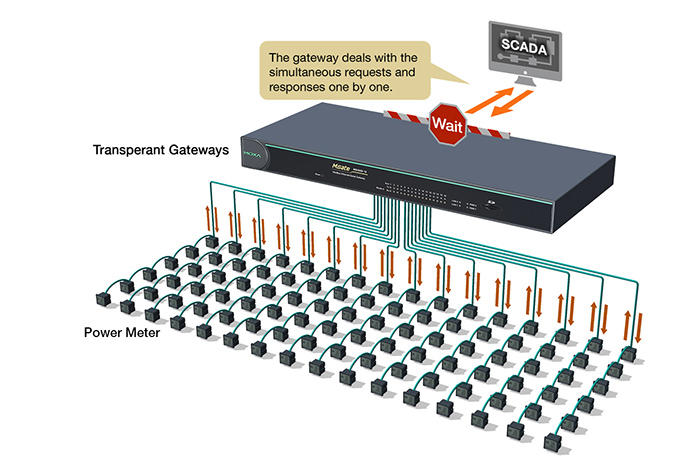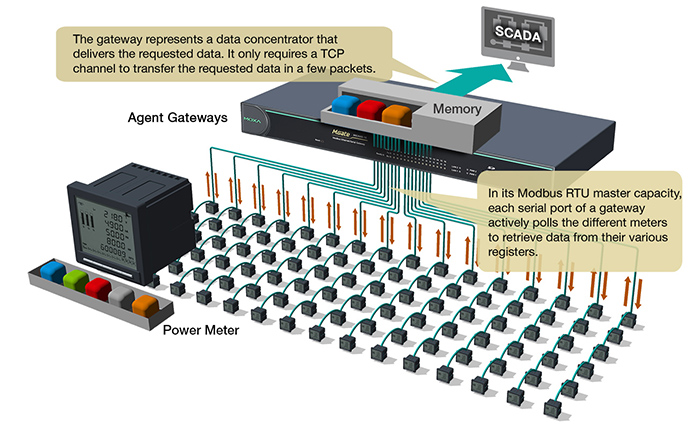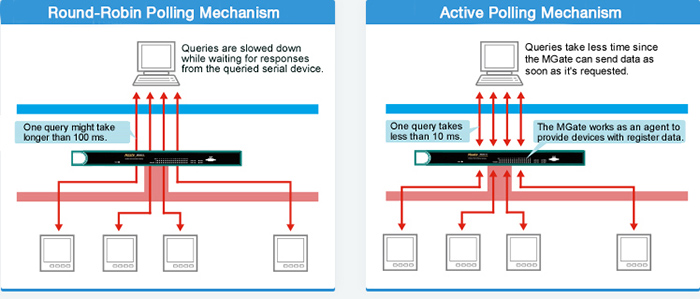Engineers can find it complicated and demanding to obtain a vast volume of Modbus serial data in Ethernet-based SCADA systems. Alongside a user-friendly protocol gateway solution for converting between Modbus serial and Modbus TCP protocols, engineers require a more efficient approach to reduce the time it takes to collect data from numerous serial devices for large-scale networks to function swiftly and seamlessly.
The Conundrum Faced by Engineers
In critical large-scale applications like power monitoring systems, SCADA systems cannot wait for field devices to respond to simultaneous data acquisition requests one after another. Consider a scenario with 300 serial meters in the field, where only one Modbus gateway is utilized to fetch data—it would take approximately 30 seconds to complete a polling cycle, which is unacceptable as it would hinder tracking data trends or analyzing failures.

Additionally, a polling cycle lasting three to five seconds is a typical necessity. Hence, engineers typically contemplate deploying multiple Modbus gateways to expedite the polling cycle. However, this can be a costly undertaking, and the more enhanced network performance required, the more Modbus gateways must be employed. Engineers are thus confronted with a dilemma: either augment the budget to meet the criteria or endure slow-speed serial data collection resulting from the traditional polling mechanism.
Revolutionary Active Polling Comes to the Rescue
Active polling, devised to surmount the limitations of the conventional round-robin polling mechanism, enables each end of the gateway to engage in communication independently of one another. One end sees each serial port of the gateway acting as a Modbus RTU master, actively polling Modbus RTU slave devices like power meters; on the other end, the gateway operates as a Modbus TCP server, polled by the SCADA system. A crucial feature of gateways supporting active polling is an internal memory that facilitates seamless data retrieval.

Active polling offers numerous advantages. It accelerates the polling cycle by tenfold compared to the round-robin polling method. The scan time only consists of the duration of the Modbus TCP request and response, as the SCADA system does not have to wait for the Modbus RTU leg of the polling process.

Another perk is that active polling enables the transfer of all data produced by devices in just a few packets. From the SCADA system’s perspective, the gateway acts as a data repository that furnishes the requested information. As a Modbus RTU, each serial port of the gateway actively polls various meters to extract data from their distinct registers. The gathered data is continuously stored in the gateway’s internal memory. It solely necessitates a TCP channel to convey the requested data in a few packets instead of setting a multitude of commands in SCADA.
Active polling offers two modes tailored to cater to divergent application scenarios—agent mode for novel system designs and intelligent mode for expanding existing systems.
Establishing a New System with Agent Mode
The crux of a freshly designed system’s success lies in a gateway that enhances a SCADA system’s performance, bolsters a SCADA program’s design flexibility, and allows for easy configuration. In agent mode, gateways support the active polling mechanism to boost SCADA performance. Furthermore, the gateway can execute myriad Modbus commands as an RTU master. While this capability provides ample design flexibility for the system, it also escalates the configuration tasks. To expedite the configuration process, gateways compatible with comma-separated value (CSV) files that can be effortlessly configured and imported into the gateway using MS Excel are undeniably advantageous, particularly for extensive deployments.
Expanding an Existing System with Intelligent Mode
In contrast to newly designed systems, expanding existing setups necessitates a swift and intelligent approach to integrating new devices while maintaining—or even enhancing—polling performance. Through intelligent mode, gateways can autonomously learn Modbus commands from SCADA systems without requiring additional command settings, as with agent mode. Gateways can leverage active polling to function as a Modbus master on each serial port. This feature proves beneficial for systems with established operations and routine command requests.
Moxa’s Offerings
Moxa’s MGate MB3660 Modbus gateways are high port density protocol gateways that incorporate an innovative active polling mechanism encompassing both agent mode and intelligent mode, enabling your data acquisition to be ten times faster compared to traditional methods, whether you are developing a new system or expanding an existing one. For more insights into our innovative polling mechanism, access our white paper: How to Enhance SCADA Systems using a Modbus Gateway
To explore further details about our solutions, visit https://www.moxa.com/protocol-gateway
- Not Only for Automobiles: Discovering CANbus Technology in Various Industrial Settings - October 29, 2024
- Boost Your Network Performance: An Exciting Manual to PoE Switches! - September 10, 2024
- Understanding Gigabit Switches: Industrial vs Regular Gigabit - September 4, 2024


